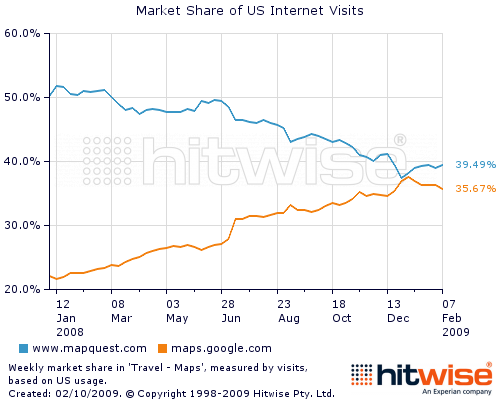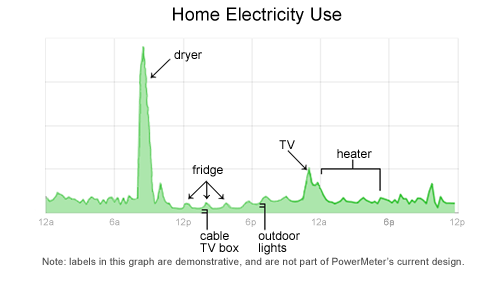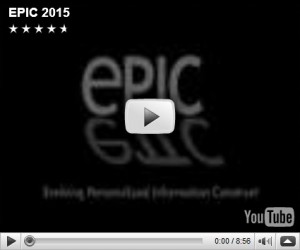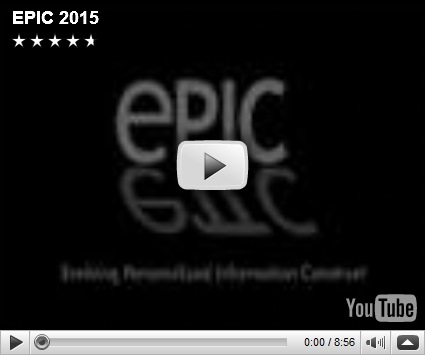 The proliferation of affordable netbooks is good for everyone – consumers, that is. Computer manufacturers loath it (high volume, low margin business) and so does Microsoft: they can’t exactly sell $100+ worth of software on a $200 machine. So they come up with all sorts of evil plans.
The proliferation of affordable netbooks is good for everyone – consumers, that is. Computer manufacturers loath it (high volume, low margin business) and so does Microsoft: they can’t exactly sell $100+ worth of software on a $200 machine. So they come up with all sorts of evil plans. 

Resistance is Futile: We Will Be Assimilated – by Google.
Two seemingly unrelated items:
Today Hitwise reported on how Google Maps is catching up on Mapquest, which once was the king of online mapping.

Perhaps more important than just the numbers is the source of traffic: 61% of Google Maps traffic comes from links placed in organic Google Search results. Contrast that to Mapquest, where 8 out of 10 hits come from searches on the Mapquest brand itself. Translation: Mapquest is only used by its already dwindling user base, while Google Maps gains steadily, since Google owns Search. The writing is clearly on the wall.
The second story: Google Gmail Within Striking Distance Of Hotmail – reported Information Week a few days ago. Wait, wasn’t Gmail supposed to be email for the geeks only, lagging behind the masses of Yahoo and Hotmail users?
Between September 2007 and September 2008, Gmail’s visitor total grew 39%, from 18.8 million to 26 million, ComScore figures indicate. Windows Live Hotmail during this period saw its visitor share decline 4%, from 46.2 million to 44.6 million.
If Google’s Gmail growth rate rises to, say, 46% over 2009, it could reach approximately 43 million unique U.S. visitors by the end of the year. And if Windows Live Hotmail continues to bleed visitors at a rate of, say, 3%, it will finish the year with around 42 million unique visitors per month.
So Gmail may overtake Hotmail by the end of this year, and if the trend continues, it might overtake Yahoo by the end of 2011, concludes Information Week. Note, these are site visits, not account numbers, but account numbers include all the throw-away, long forgotten dormant accounts that both Yahoo and Hotmail has in abundance. All these email systems being web-based, visitor stats are a better representation of actual usage.
The third story (yes, I promised two, but can’t stop now): The Google Power Meter., currently being tested by Google employees. These are smart devices you plug in all around the house, they will report back to the mothership and you get a nice dashboard aimed at helping you making the right energy choices.

I would certainly like to know just how “smart” they can be – any chance of bi-directional communication? I can’t help but remember the mail campaign from PG&E, my utility company. They are handing out $25 to anyone who allows them to install a smart thermostat free of charge. The catch? At times when consumption reaches peak levels, the utility company can remotely throttle back your air conditioner. So now you see why I’m hesitant about these Google electricity meters. Could they be switched from passive reporting to regulating one day?
The fourth story (gee, I really have to stop soon): An opinion piece on Bloomberg discusses how the health provisions slipped into the stimulus bill will effect every one of us in the US:
Your medical treatments will be tracked electronically by a federal system. Having electronic medical records at your fingertips, easily transferred to a hospital, is beneficial. It will help avoid duplicate tests and errors. But the bill goes further. One new bureaucracy, the National Coordinator of Health Information Technology, will monitor treatments to make sure your doctor is doing what the federal government deems appropriate and cost effective. The goal is to reduce costs and “guide” your doctor’s decisions (442, 446).
Ouch. I’m all for electronic medical records, but I don’t want them to be turned into a Big Brother function. And I don’t want a computer program to decide on my medical treatment. But I’ve just complained about the Sorry State of Health 2.0: neither Google Health nor Microsoft HealthVault are up to the job yet. I want them to get there, and I trust they will (at least one of them). I don’t want them to run my health care, just help me and my providers manage it – but fear of potential misuse won’t stop my desire for progrees.
Do you see the trend here? Google is unstoppable. They want to manage all data, but our life is increasingly all about data and what we do with it. The former Borg in Redmond is now a toothless veteran, slowly dwindling away – Google is the New Borg. Resistance is futile. We’re being assimilated. And we like it. Enjoy the video: (better quality if you click through)
Related posts:
(This post originally appeared @ CloudAve. To stay abreast of Clod Computing, SaaS news and analysis, grab the CloudAve feed here.)

Microsoft, the Walking Dead
Over a year ago Paul Graham caused quite some uproar calling Microsoft Dead. Unlike in the 90’s, none of his startup Founders fear (or even respect) Microsoft. They have their eyes on Google and other startups – so Microsoft must be dead. Cash-rich, wildly successful – just not a future force to reckon with.
Today I read evidence that Paul Graham is right. Todd Bishop produced a Bill Gates email from 2003, in which the Microsoft CEO complains about his own systems usability (or lack of).
—- Original Message —-
From: Bill Gates
Sent: Wednesday, January 15, 2003 10:05 AM
To: Jim Allchin
Cc: Chris Jones (WINDOWS); Bharat Shah (NT); Joe Peterson; Will Poole; Brian Valentine; Anoop Gupta (RESEARCH)
Subject: Windows Usability Systematic degradation flameI am quite disappointed at how Windows Usability has been going backwards and the program management groups don’t drive usability issues.
Let me give you my experience from yesterday.
I decided to download (Moviemaker) and buy the Digital Plus pack … so I went to Microsoft.com.
…
This site is so slow it is unusable.
…
Someone decided to trash the one part of Windows that was usable? The file system is no longer usable. The registry is not usable. This program listing was one sane place but now it is all crapped up.
…
So after more than an hour of craziness and making my programs list garbage and being scared and seeing that Microsoft.com is a terrible website I haven’t run Moviemaker and I haven’t got the plus package.
The lack of attention to usability represented by these experiences blows my mind. I thought we had reached a low with Windows Network places or the messages I get when I try to use 802.11
I tried to selectively quote from this email, but it’s impossible. This email is a goldmine, you have to read it in its entirety.
It sounds like John Doe Windows User spilling out all his frustration with a useless, unfriendly system. Or like me, ranting about Vista. Which brings me to my point: although we’re blinded by the sales success, a result of monopoly, nothing changes the fact that Vista is widely considered a fiasco. If this is the best the world’s richest company could come up with 5 years after the CEO’s angry rant – well, that speaks for itself. Microsoft is dead. Rich, powerful, but without a future. A Walking Dead.
(And now you can call me crazy.)
Update (6/25): Jeff Nolan feels sorry for Citizen Bill: Of course he’s right about the usability… too bad he can’t switch to a Mac.
Phil Wainewright is wondering whether Gates is “a secret cloud convert, or have I been drinking too much of my own Kool-Aid again?”
Michael Krigsman points to this PDF which shows some of the follow-up email correspondence – you’d think after the CEO /Chairman rants so explicitely, they rush to find a solution. Instead, what we find is fingerpointing, politics, total corporate inertia. That’s what kills (formerly great) organizations.
Update (10/7/2010) – Good read @ Computerworld: Microsoft’s coming heart-attack moment

The Microsoft Vista Fiasco: Who is Evil Now?
Yes, it’s a harsh title. Yes, I’ve long been critical of Vista. But so far I thought it was just incompetence, the Behemoth having lost their edge. Naive me… this piece in The New York Times is a true eye-opener.
It starts with what appears to be average users’ stories (bare with me, it gets better):
- Jon upgrades two XP machines to Vista, only to find none of his peripherals work anymore
- Steven confirms drivers are missing in the entire ecosystem
- Mike buys a “Windows Vista Capable” laptop which turns out to be a $2,100 email machine, as it doesn’t run his favorite programs, and only can handled the castrated version of Vista that shouldn’t exist in the first place.
If these users didn’t know better, I wonder who should. They are all senior Microsoft Execs:
- Jon A. Shirley, a Microsoft board member.
- Steven Sinofsky, Microsoft senior vice president responsible for Windows.
- Mike Nash, a Microsoft vice president who oversees Windows product management.
They and several other Microsofties warned about the consequences of reducing the original strict hardware requirements and labeling underrated computers as Vista Capable:
The decision to drop the original hardware requirements is accompanied by considerable internal protest. The minimum hardware configuration was set so low that “even a piece of junk will qualify,” Anantha Kancherla, a Microsoft program manager, said in an internal e-mail message among those recently unsealed, adding, “It will be a complete tragedy if we allowed it.”
That this would result in disaster was foreseeable:
“It would be a lot less costly to do the right thing for the customer now,” said Robin Leonard, a Microsoft sales manager, in an e-mail message sent to her superiors, “than to spend dollars on the back end trying to fix the problem.”
He and others were not listened to. Now Microsoft is facing a class action lawsuit: nothing new to the Redmond giant, just a calculated risk. “Where does Microsoft go to buy back its lost credibility?” asks The New York Times.
Nowhere. They stopped caring a long time ago. The Monopolist does not have customers: they have loyal subjects used to pay their taxes to Microsoft. Except that they are not that loyal anymore, and there are visible cracks on the walls of the empire. There is Linux, Mac OS, Web Applications – customers are slowly realizing they actually have a choice. Choice is the end of all monopolies, it’s just a matter of time. The Borg could slow the process by trying to be user-friendly, at least pretend to care about customers. Deceptive behavior like this shows they don’t care. They are digging their own grave.
(Please, don’t get me started on how profitable Microsoft is doing – I am talking about a trend, and it takes time….)



Recent Comments